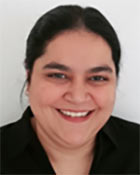Oct
02

Date: 2 October 2024
Time: 8:00 AM ET (New York Time)
Presenter(s): Dr. Krishna Agarwal
Based on the IEEE Xplore® article:
Physics-Guided Loss Functions Improve Deep Learning Performance in Inverse Scattering, published in the IEEE Transactions on Computational Imaging, March 2022.
Download article: Original article is open access, and publicly available to all for download.
Abstract
Artificial Intelligence (AI) is becoming pervasive. In the last two decades, the developments in AI have resulted from application-driven demands, which include solutions that are accurate, black box or not. This has therefore resulted in fast growth of deep learning (DL) algorithms, and the common practice has been to use them directly for a variety of applications without resorting to application-specific optimization. However, in the last few years, AI in general and DL in particular are being explored also for scientific problems. It has been increasingly realized that using DL as plug-and-play solutions is not suitable for scientific data and problems, and that AI and DL solutions need to be integrated with the physics of the scientific application in order for them to either perform better, be fail-safe, or be scientifically explainable. In this webinar, the presenter will discuss a variety of approaches for integrating the physics of the scientific application with AI/DL solutions. She will explore how these approaches have been used in cutting-edge research across a variety of scientific problems.
Biography

Krishna Agarwal received the B.Tech. degree from the Indian Institute of Technology (Indian School of Mines), Dhanbad, India, in 2003 and the Ph.D. from the National University of Singapore in 2011.
She is currently a tenured professor in the Department of Physics and Technology at UiT, The Arctic University of Norway. She was a post-doctoral associate at Singapore-MIT Alliance research & Technology Centre since 2014 to 2016, a research fellow at National University of Singapore from 2010 to 2014 and a Scientist at the Defence Research and Development Organization, India, from 2003 to 2006 where she worked towards the development of the front end of the active phased array radars. Her current research interests are computational nanoscopy, super-resolution imaging, and inverse problems.
Dr. Agarwal received the "Distinguished Alumnus Award" from Indian Institute of Technology (Indian School of Mines), Dhanbad India for the year 2020. She was awarded the Marie Skłodowska-Curie Actions Individual Fellowship for the years 2017-2019. She was awarded the "Young Scientist Award" by Union Radio Scientifique Internationale (URSI) in the year 2011. She also serves as an associate editor for the IEEE Transactions on Geoscience and Remote Sensing (T-GRS)
